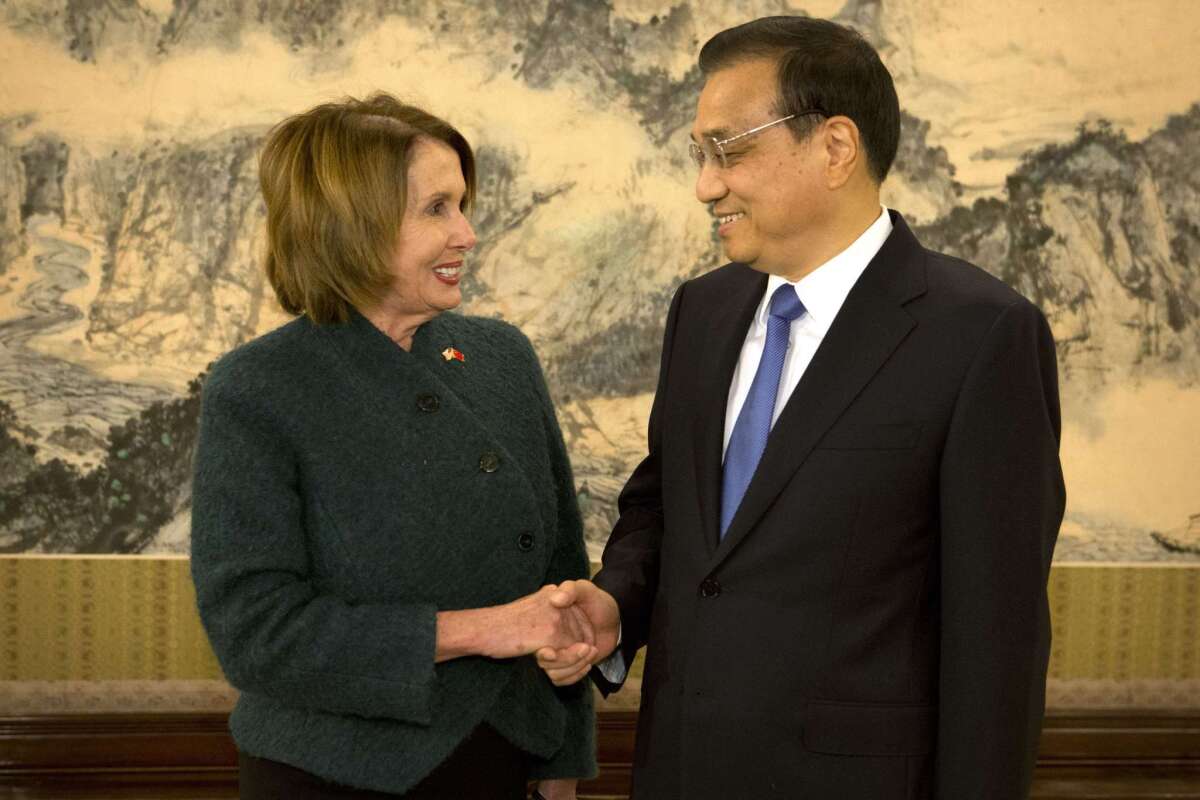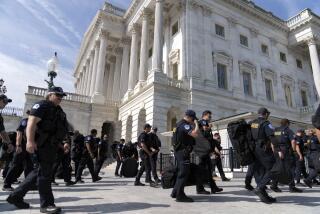U.S. Congress members tell of their visit to Tibet

U.S. House Minority Leader Nancy Pelosi shakes hands with Chinese Premier Li Keqiang as she arrives for a bilateral meeting at the Zhongnanhai leadership compound in Beijing on Nov. 13, 2015. Pelosi and six other Congress members recently visited Tibet.
- Share via
Reporting from Beijing — House Minority Leader Nancy Pelosi (D-San Francisco) and Rep. Jim McGovern (D-Mass.) haven’t been afraid to speak out about what they see as repressive Chinese policies in Tibet.
Pelosi this year delivered a speech on the House floor celebrating the Dalai Lama’s 80th birthday (Beijing regards the Buddhist leader as a “splittist”). McGovern sponsored a bill that would bar certain Chinese officials from the United States as long as China continues to significantly restrict American diplomats, journalists and others from Tibetan areas.
So, many people were surprised when it came to light last week that Pelosi, McGovern and a group of other Democratic lawmakers had been granted access to Tibet during a trip to China. Word of the Nov. 10 visit trickled out after Pelosi and the other members of the delegation arrived in Beijing, but in the days afterward, the U.S. lawmakers offered only terse accounts of what they saw and did during their time in the Tibetan capital, Lhasa.
No foreign journalists were invited to accompany the delegation to Tibet, and the lawmakers did not hold a press briefing in Beijing about the trip. They issued a news release about it only after arriving back on U.S. soil Saturday.
On Tuesday, the delegation spoke in Washington about their experiences, with McGovern calling it an “important gesture” but saying the Americans had some “very heated exchanges with Chinese government officials over a whole range of issues,” including the Dalai Lama.
Pelosi described the visit as highly controlled, estimating that more than 30 Chinese security officers accompanied the delegation of seven. Though she could not be sure just how Potemkin what they saw was, she noted, for example, that what China “wanted us to see was housing. And we did. Did we see families? I’m not sure.”
Still, she called the trip “very valuable,” adding: “The difference between seeing and not is vast – no matter how they show you what they want you to see.”
The delay in giving a robust account of the trip gave Chinese state-run media ample time to offer their own glowing accounts of the visit. The state-run Tibet Daily said that Pelosi “gave high praise to the huge changes in the new Tibet and to the hard work of the Chinese government in protecting religious freedom, preserving traditional ethnic culture and protecting the ecology.”
No mention of heated exchanges was made during the state-run CCTV’s evening news broadcast about the visit.
Activists in China and elsewhere are now questioning whether the unusual visit might mark a new era of dialogue and openness about Tibet on the part of the Chinese government — or may signify an increasingly sophisticated public relations strategy by propaganda officials who are confident they have gained the upper hand in Tibet since deadly riots in 2008.
Though there have been no reports of such mass violence in Tibet in the last seven years, about 140 people in Tibet and neighboring areas of Sichuan and Gansu provinces have immolated themselves since 2009 to protest Chinese policies that they say limit their freedom of movement, speech and religion, particularly their right to venerate the Dalai Lama.
“It’s really interesting that Nancy Pelosi was invited. She is certainly the staunchest friend of Tibet to go there in the last few years,” said Alistair Currie, campaigns and media manager for the Britain-based group Free Tibet.
This summer, Sarah Sewall, the State Department’s special coordinator for Tibetan issues, said that over the last four years, 35 of 39 requests made by the U.S. Embassy or consulates to visit the Tibet Autonomous Region had been denied.
But following years of almost total lockdown after the unrest in 2008, Currie said, there has been a “very gradual opening up” since 2012, with Australian Ambassador to China Frances Adamson visiting in 2013 and U.S. Ambassador to China Max Baucus visiting in May.
“Obviously dialogue is important, and this could be the first step to something further,” said Paul Golding, campaigns coordinator of the London-based Tibet Society. “But nothing has changed on the ground. It’s not any indication of any improvements for Tibetans themselves.”
Pelosi said that hers was the first U.S. congressional delegation to enter Tibet since 2008 and that the visit focused on issues including human rights and climate change. Besides McGovern, other members of the delegation -- all Democrats -- were Reps. Alan Lowenthal of Long Beach and Ted Lieu of Torrance, Betty McCollum and Tim Walz of Minnesota, and Joyce Beatty of Ohio.
McGovern called on China to allow the U.S. to open a consulate in Lhasa; permit more foreign lawmakers, journalists and others to travel freely to Tibet; and renew dialogue with the Dalai Lama, calling him “part of the solution, not the problem, to resolving the issues confronting Tibetan autonomy.”
“The Chinese government has invested a great deal in Tibet, and that was very clear to us,” McGovern added. “But that investment should not come at the price of an entire culture. You cannot confine a people’s culture and heritage – their very sense of identity – to a museum or a market of handicrafts.”
Pelosi indicated the visit arose after she raised concerns about democracy and human rights with Chinese President Xi Jinping during his visit to the U.S. in September.
“He said, at the time: ‘Come see for yourself.’ I considered that an invitation,” she said.
But she said that Chinese authorities did not approve the lawmakers’ visas for Tibet until the day before they left and that non-Chinese media were not allowed to accompany them.
Among the sites visited by the Americans was Potala Palace, the traditional home of the Dalai Lama, and Sera Monastery. The group met with officials including the Communist Party chief of Tibet, Chen Quanguo; the vice party secretary of Tibet, Baima Chilin; and the Communist party boss of Lhasa, Qi Zhala.
Earlier this year, Chen called for Buddhist temples and monasteries in Tibet to become propaganda centers for the Communist Party, turning them into places where monks and nuns learn to “revere” science and appreciate the party’s love.
Woeser, a Tibetan activist and writer who generally goes by one name, said China’s increasingly frequent but highly controlled invitations to visit Tibet pose a quandary for foreign dignitaries, reporters and others.
“Everyone wants to go — especially the foreign press. But if you don’t get approval [from the government] and don’t follow their arrangements, you won’t be allowed. You have to follow who they say and where to go. This is a difficult situation,” she said. “If you don’t agree to preconditions, you can’t go. But if you follow the closely arranged itinerary, you’ll be used by the Chinese government as well. So there’s no good choice for foreign press or politicians when it comes to Tibet.”
Currie recalled that in 2014 China invited a group of foreign dignitaries to Tibet, including the former mayor of Christchurch, New Zealand, Bob Parker, and a senior Labor Party politician from Britain.
“They wined and dined them and gave them the full propaganda treatment. And at the end of that, state media reported that they had signed something called the ‘Lhasa Consensus,’ which was basically saying, ‘China is doing a great job, look at the economic development, protection of Tibetan Buddhism,’” he said. “After that, a number of the dignitaries repudiated the document and said that they had no idea that we were supposedly signing up for this.”
In September, Chinese authorities invited a few foreign journalists from outlets including the Associated Press to visit Tibet; AP reporter Aritz Parra described it as a tightly scripted visit to showcase Tibet’s development.
Geshe Nyima, a cousin of Tibetan spiritual leader Tenzin Delek Rinpoche, who died in Chinese custody in July, said his friends and relatives in Tibet tell him that their communities remain under tight police control and surveillance.
“Obviously if more people can go to Tibet and speak freely to people there about what’s going on, that would be useful,” said Nyima, who lives in Dharamsala, India, the Dalai Lama’s home in exile, and who briefed a U.S. congressional panel chaired by McGovern in September. “But if visitors can’t go freely and are watched so closely, then it’s not going to do much good.”
Times staff writer Sarah Wire in Washington contributed to this report.
Twitter: @JulieMakLAT
More to Read
Sign up for Essential California
The most important California stories and recommendations in your inbox every morning.
You may occasionally receive promotional content from the Los Angeles Times.











